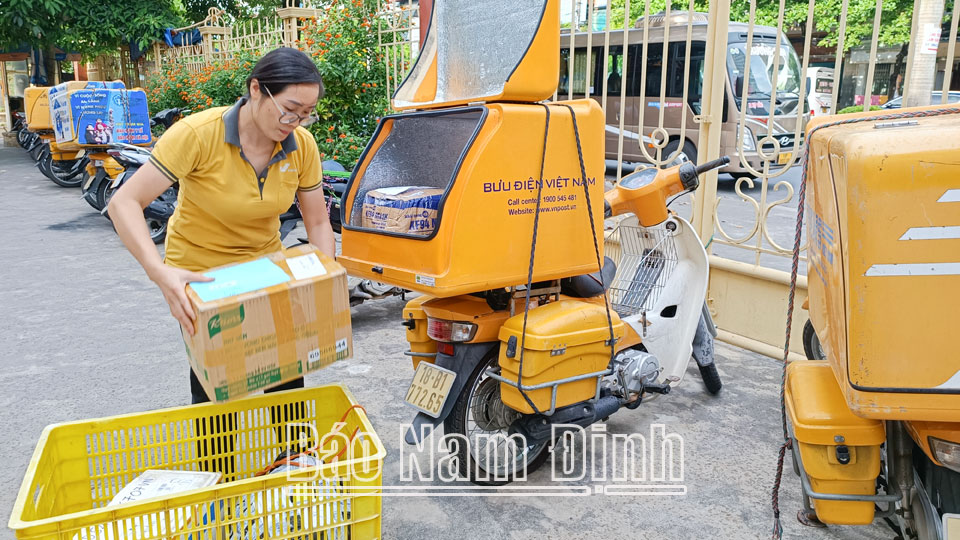Throughout the province, from cities to rural areas, from bustling industrial zones to remote coastal fishing villages, the footprints of postal workers are everywhere. Each day, they begin work much earlier than the scheduled "office hours" to deliver newspapers, letters, and parcels carrying information and joy to countless people.
 |
| Ms. Tran Thi Cai, a postal worker at the Delivery Post Office - Transportation and Exploitation Center (Provincial Post Office), prepares parcels for delivery to customers. |
Ms. Tran Thi Cai, a postal worker at the Delivery Post Office - Transportation and Exploitation Center (Provincial Post Office), has been working as a postal worker since 2011, having previously worked as a transaction officer. Ms. Cai currently covers the area of three wards: Loc Ha, Thong Nhat, and Ha Long. With a large area and a high volume of mail and parcels to deliver, she wakes up at 5:00 AM to go to the market and cook for her children, starting her workday at 6:00 AM. At 6:00 AM, she and other postal workers are at the Provincial Transportation and Exploitation Center to collect and deliver goods to the Giai Phong Delivery Post Office. After collecting the goods, she delivers continuously until 2:30 PM before taking a lunch break. Ms. Cai takes a quick lunch and rest for about 45 minutes before resuming collecting and delivering goods at 3:15 PM. On average, she travels about 60km each day. Ms. Cai usually finishes work around 6-7 PM. “That’s the typical workday schedule. Some days I have to finish later, around 8-9 PM, because customers are busy and they only want to receive their packages at that time. For us postal workers, we only consider the workday finished when all the packages are delivered,” Ms. Cai said. Having worked as a postal worker for about ten years, Ms. Cai enthusiastically told us about her profession, her passion, and the joys and sorrows of being a postal worker. “Although I haven’t been a postal worker for long, my long experience in the postal service has given me a relatively good understanding of the work of a postal worker. The 1980s and 90s were a very difficult time for postal workers; income was low, and travel was very arduous. Back then, the postal workers had to deliver letters, newspapers, and parcels by bicycle, and the roads weren’t as good as they are now. By 1995-1996, only the wealthiest could afford a motorbike, and even then, they had to choose used ones for fear of theft when stopping to deliver letters or parcels. We, though still struggling, are much better off than those who worked in the past; the roads and transportation are much more convenient,” Ms. Cai confided.
Being a postal worker is hard work, but it also has its joys. According to Ms. Cai, a few decades ago, when the internet wasn't developed, mobile phones were a luxury, and landline phones were limited, handwritten letters were the golden age. For postal workers, delivering letters was like "bringing joy" to each family. Nowadays, although handwritten letters are less common, there are still people who prefer writing and receiving letters, especially the elderly. "For the elderly, a phone call from a relative might not be as joyful as receiving a letter. Therefore, when they receive a letter, they are very touched and thank us profusely. At that moment, all my fatigue suddenly disappears," Ms. Cai shared. However, according to Ms. Cai, delivering letters sometimes leads postal workers like her into "funny yet sad" situations. Specifically, for a letter to reach the correct recipient, people need to write the correct address, including house number, street, commune (ward), district, city, province, and phone number. However, the current urbanization process has made it difficult for some people, especially the elderly, to update their addresses in areas that have been upgraded from "rural" to "urban." Furthermore, many newly formed residential areas lack house numbers, forcing residents to use addresses based on land plot numbers and project names. Even when new street names and house numbers are available, the inability of senders to update these addresses in time creates difficulties for postal workers in delivering letters and parcels. “In these cases, we have to rely on ‘experience,’ checking the names in previous letters to ‘guess’ the recipient’s address. We also regularly go online to read information and update ourselves on new neighborhoods, street names, etc., to facilitate delivery. After finding the households receiving the letters and parcels, I remind them to update their addresses to inform the sender, avoiding confusion and loss of letters and parcels in subsequent deliveries,” Ms. Cai recounted. Incomplete addresses, including house numbers, street names, ward names, and phone numbers, still exist and are the cause of complaints whenever letters, newspapers, or parcels arrive late or cannot be delivered because the postal worker cannot find the address. This is especially true for important documents such as exam notices and enrollment notices. When complaints arise, the primary responsibility is always attributed to the postal worker, and no one considers that most of these errors are due to the sender's unclear address. This is also one of the occupational risks of being a postal worker.
Mai Van Luc, born in 1995, from Nam Tien commune (Nam Truc district), has only been working as a postal worker for over a year. Previously, Luc was a freelance worker. As a postal worker for the Nam Tien Commune Cultural Post Office, responsible for the areas of Nam Tien and Nam Loi communes, Luc's workday is quite busy. At 8 am, Luc picks up packages from the Co Gia Post Office in Nam Tien commune and the Nam Loi Commune Cultural Post Office, then starts delivering from 10 am until all packages are delivered. At 5-6 pm each day, Luc begins a new job, picking up packages from households or shops that the post office needs to send. It's not uncommon for the young man to still be out delivering parcels and goods at 8-9 pm. On average, Luc delivers 50-60 packages a day, covering a distance of about 60 km. For Luc, the difficulty of the job is that sometimes when he calls, the recipients don't answer because they see an unfamiliar number, or they intentionally "bomb" the delivery, wasting his time making multiple trips. It's also a relatively hard job; no matter the weather, he still has to "hit the road" to complete his mission. Whether it's a scorching hot midday or a freezing cold winter afternoon, or even a storm with strong winds, the postman diligently travels every road to ensure newspapers are delivered on time, and letters and packages, especially express deliveries, reach the right recipients. Despite the hardships, for this young man, the postman job is "more fun than sad." "Being a postman gives me the opportunity to travel a lot, meet many people, and learn about different situations, thus accumulating more experience and life skills. Moreover, being a postman allows me to be proactive in managing my time, so I feel very comfortable."
With societal development and the widespread adoption of modern information technology, handwritten letters are gradually being replaced. However, many people still trust the postal system to send contracts, invoices, documents, and goods, with postal workers directly handling the delivery and receipt. Despite the hardships of their work, the postal workers we met always prioritize their responsibility: "Ensuring speed, convenience, timeliness, and accuracy." Their love and dedication to their profession are therefore all the more valuable.
Text and photos: Hoa Quyen
Source link












































































































Comment (0)